Clear Blue Sky | Interview | John Simms
Clear Blue Sky was a heavy rock band from the UK that released an album for Vertigo in 1971.
John Simms, Ken White and Mark Sheather all originated from Acton, West London and began playing music at a very early age. They formed their first band whilst still attending school which was a rhythm and blues outfit they called Jug Blues. They swiftly boarded the club circuit, performing a set of cover songs to all and sundry.
An extensive tour of Germany resulted and this was a success. It was at this point that they decided to write their own material. Their primary set evolved. It was “raw, fresh, with a brutal edge” said one journalist, and certainly original. They took it to the listening ears everywhere performing under various band names such as ‘X’ and ‘Matuse’, Covering the entire UK circuit and Europe. They entered the famous Marquee club talent contest in London and won outright. As they came offstage, they were approached by Donavan’s manager, Ashley Kozak, and the band worked with him for some time. Bigger status was achieved. The band played on the same bill as Big Brother & the Holding Company, Taste, Country Joe and the Fish, Free, Gentle Giant and so on. Their unique style had now fully emerged and new songs were constantly being created. The music was highly experimental and heavy, and belied their youth. They began to collect a loyal following. The vitality and originality of the music together with their musical ability soon attracted the attention of the record companies. One of the foremost producers of that era, namely Patrick Campbell-Lyons, formerly of the 60’s chart success band Nirvana, came to see who was creating the buzz, and instantly decided the band had enormous potential. The band thereafter took the name ‘Clear Blue Sky’. Within the spring of 1970, Patrick Campbell-Lyons signed the band to the celebrated Vertigo record label. John Simms was not yet eighteen, and that summer they went into the studios to make their first album, which was (eventually) self titled (some early press releases give the title as ‘Play it Loud’ which was subsequently dropped), and featured one of the very first cover designs by artist Roger Dean. It was released on vinyl in January 1971.
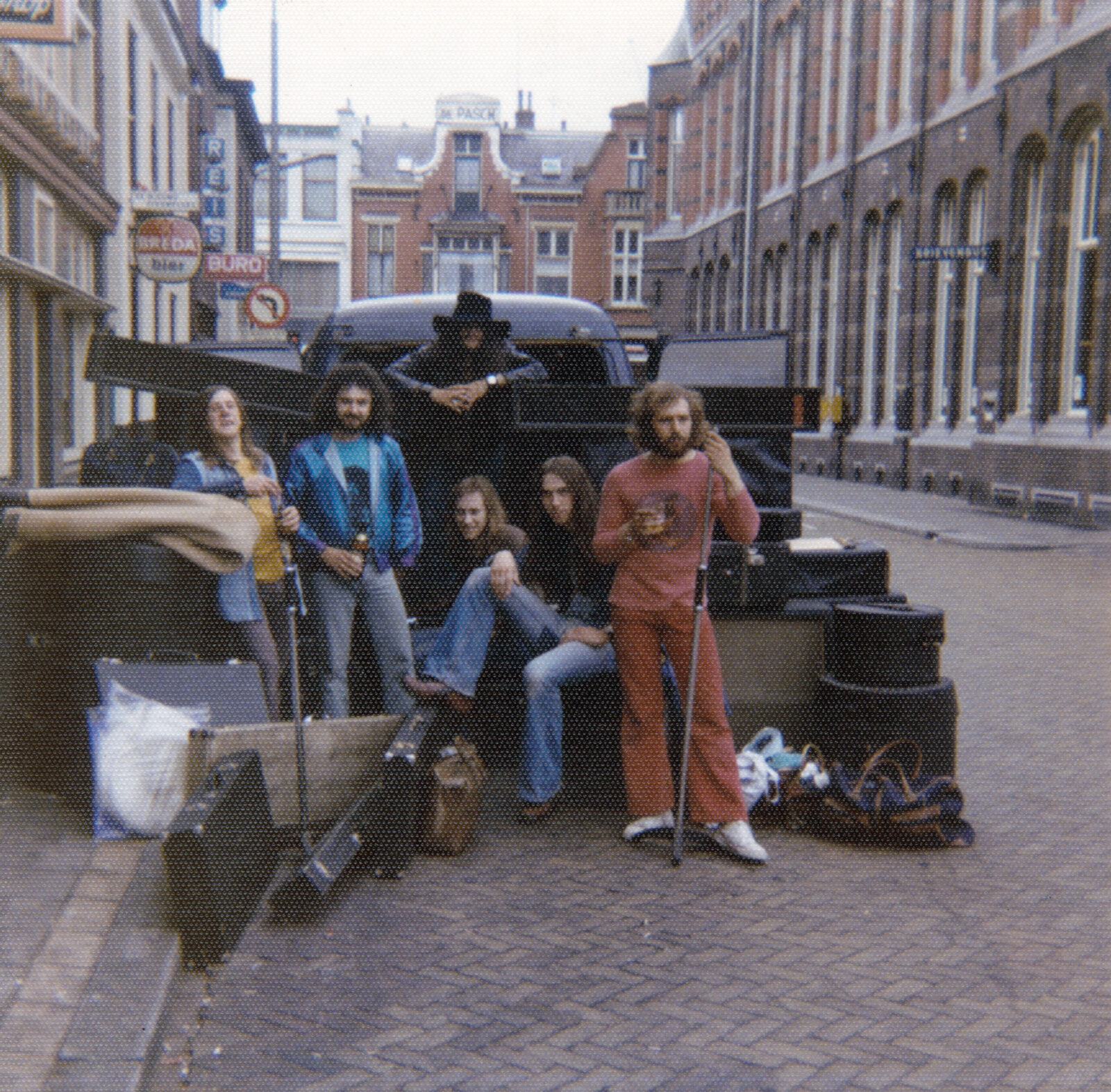
One of the most amazing things about Clear Blue Sky is that you were only around 18 when you recorded a highly consistent LP. It’s not often that all members from the band have such pure talent.
John Simms: Yes, when I look back and realise how young we were (I was the youngest in the band), it seems incredible, especially as the music was entirely original, but it is what it is, it just came naturally and spontaneously. We remain Vertigo label’s youngest signing. The age of consent was 21 then, and we were too young to sign a contract, let alone understand it, we were just lowly kids from Acton in west London, enjoying ourselves and knew nothing about business. For me the music was an escape and distraction from a difficult life, and it contains plenty of angst and energy.
Vertigo allocated a decent amount of time for the album creation, but the producer rushed things, because he wanted to use a large portion of the time for another project. I was hoping for something highly experimental, which is my nature, but alas, it wasn’t to be. They did try to get me to record the singing separately, but you know, it didn’t quite work. So we recorded the singing and me playing guitar simultaneously instead. Really what you hear on that first album is more or less a live album with a few overdubs. But in retrospect, I think a lot of people like that, because it captures the vitality and naturalness of the origins of the band. Plus, it’s been re-released so many times I’ve lost count.
But I wasn’t satisfied with the overall finished product. There was so much more I could have done.
When did you first pick a guitar? Was there a special moment in your life that you instantly knew that you wanted to be a musician for the rest of your life?
I know exactly. My future brother-in-law (my sister was much older than me) gave me an acoustic guitar, with hardly any strings on. I was in the infant’s school then, but I plink-plonked around with it endlessly. Eventually, my dad, seeing my passion on the beat up acoustic, bought me a Futurama 2 electric guitar. I was still a schoolboy of course, but was thrilled with it. Life was tough in my south Acton family, and I escaped the difficulties by teaching myself, as I could not get on with formal lessons, and have never learned to read music. I would get vinyl records by old blues daddies and play along. My roots are in blues, and blues roots of course are from spirituals.
Clear Blue Sky was formed when you were basically a teenager, but you already were in other groups before. Tell us about those groups and what kind of material did you play with them?
The very first band was Jug Blues, with Ken White on drums, Dick Ward on bass and myself. It was basically a blues covers band, us putting down roots. Then came Matuse, a natural progression of blues and some original material. We started doing performances for the school, and anywhere they would have us. There was a lot of r’n’b around then. A guy who lived nearby had a blues band. His name was Bruce, he was a great harmonica player. We would listen to his band, and he introduced me to a lot of blues music, including Howlin’ Wolf and artists like that, which really resonated with me.
So we took on the blues mantle, and did all sorts of covers such as Bo Diddley, Howlin’ Wolf, Muddy Waters, very early Yardbirds stuff and the like. It provided a solid learning base for everything else that followed. I still love the blues to this day. But my goodness, we were probably only about 14-15 years old or so. We only have a couple of old, scratchy photos, but it does capture the moment somewhat…
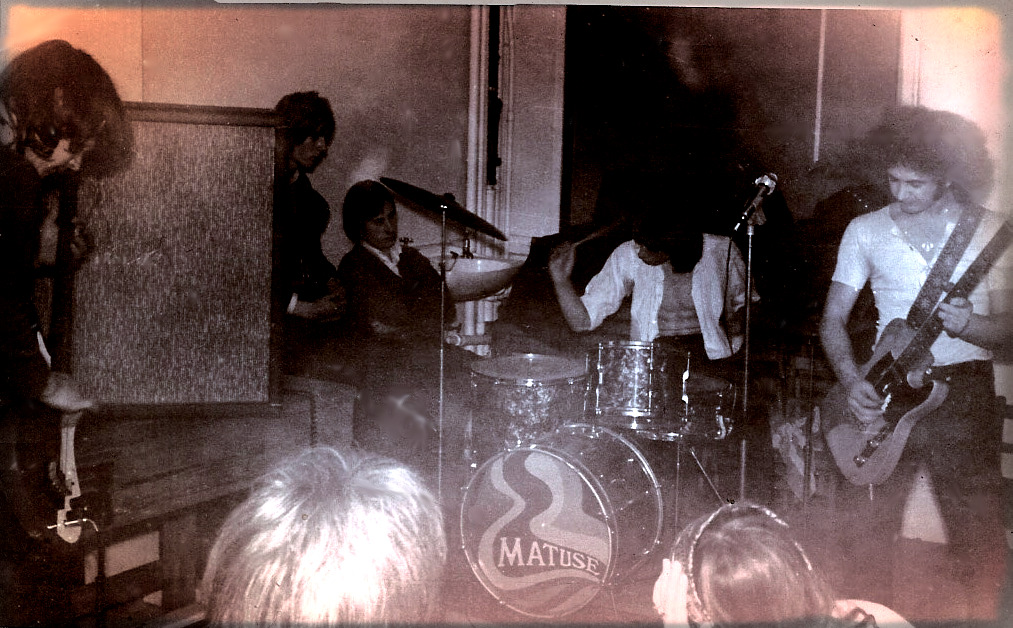
What clubs did you play with Jug Blues?
The gigs were mostly local, such as Acton Town Hall and the schools, The White Hart Hotel in Acton where The Who and such bands also played, bearing in mind in today’s world we would be classed as children. But also, the live music scene was just getting going for rock stuff. We rehearsed in a youth club at our school for free, as we had no money.
Under which management were you signed and why so many name changes? Who were other members of the group?
We never really had any management, it was just word of mouth that got back to promoters and venues. I guess it was something of interest to people in us all being so young. So no management for Jug Blues, but when we progressed to become Matuse, with original songs emerging, Ashley Kozak (best known as Donavan’s manager) saw us at the Marquee Club, and had interest in being involved. But he wanted to manage me, and for me to become a part of his commercial projects and leave Matuse. I was so focused on what I was doing that I refused. We never actually signed with any management at all, although Laurie Jay (Billy Ocean et cetera) did guide us for a while, but he also had more commercial direction.
Lionel Bart (Oliver musical) also got interested in us, and the emerging original style of music, but he had his own ideas, and I was so stubborn, I just wanted to explore and develop my own style. These interests may have led to commercial success but I have no regrets.
The other members of Clear Blue Sky were Ken White, drums, and Mark Sheather, bass. Mark gave up music for marriage just after the release of the first album. Andy Chard replaced him for a short while, and then Kraznet. All these people remain close friends. Ken has dipped in and out of the band throughout the years. He’s always run businesses. Ken has a great musicality; his emotional connection to the music is quite something. He lives on the other side of the world now, so our recording days are over. We all lived near one another in our youth and were friends as kids. I’ve just re-acquainted with Mark in recent times, which is good.
What were some of the biggest names you played with?
There are so many, but off the cuff, Gentle Giant, Big Brother & the Holding Company, Free, Rory Gallagher, Graham Bond, May Blitz, Country Joe and the Fish, Status Quo, Marmalade…and many others, far too long a list to mention. The music scene was so vibrant then, and fame didn’t mean a thing to me, I was just so focused on the music. People went to see bands for the music and originality. A great deal of that has changed today. There are few live venues, and many people go out to see cover bands and just to have a good time.
It’s really unusual that you were THAT young back then.
Hahaha! Yes, I’ve certainly come to realise that over time. We were too young to drive, so we used a baby pram, a butcher’s bike with a basket, and an old pushbike to get all our equipment around. We were very poor too, as none of us were old enough to work. Ken and I had paper rounds to earn a little money.
It would be pretty impossible to do that in the US due to age restriction.
Oh yes, absolutely impossible. But it was an entirely different world then, and I’m surprised my early bands went to Europe at such a young age, but to go to the USA was impossible then.
I interviewed Patrick Campbell-Lyons of Nirvana on several occasions. He was very interested in you at the time?
Yes he was. He came to see us rehearse in the school hall and things happened swiftly. I do not have any contact with him however. He never managed us. He was the producer.
Now please explain how a 17-year-old kid gets signed to Vertigo Records?
Good question. I guess our passion was one element. We played anywhere and everywhere. We had the energy to do it too, because although the drug scene was buoyant then, we never really got involved with that. But foremost, I guess it was the originality of the music. I became so focused once I started writing our own material, and I became quite a prolific writer. Still am. When the first album was done, I had no real say in what songs went on it, and I feel so many of the better songs were not recorded. But later, we got together and recorded them. I’ve got them in the archives, and I’ve been thinking about doing something with them as it captures that early sound.
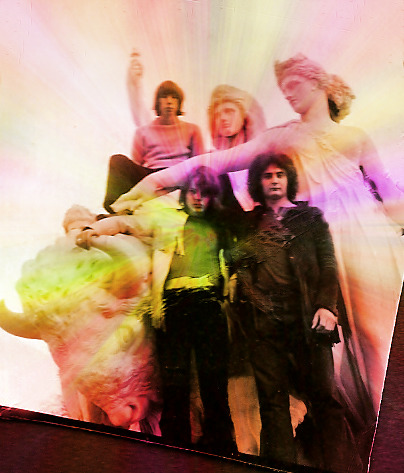
“I would have liked more time and space to experiment”
Clear Blue Sky’s debut album was recorded in a very short period of time. What do you recall from the recording sessions?
It was a great experience to record at Island Studios, and of course, we were so young and naive. Patrick Campbell-Lyons had some good ideas and we enjoyed putting it into practice. It was particularly good working with Roger Beale the engineer, who was very experienced, as you would expect. Our band at that time was very tight and full of passion, and we laid the music down very fast, within 24 hours. Done. But I would have liked more time and space to experiment.
They tried the usual method of recording my vocal and guitar separately, but Patrick noted it really was missing something. So we recorded me singing and playing guitar at the same time and that captured ‘it’. It was virtually a live recording with a few overdubs.
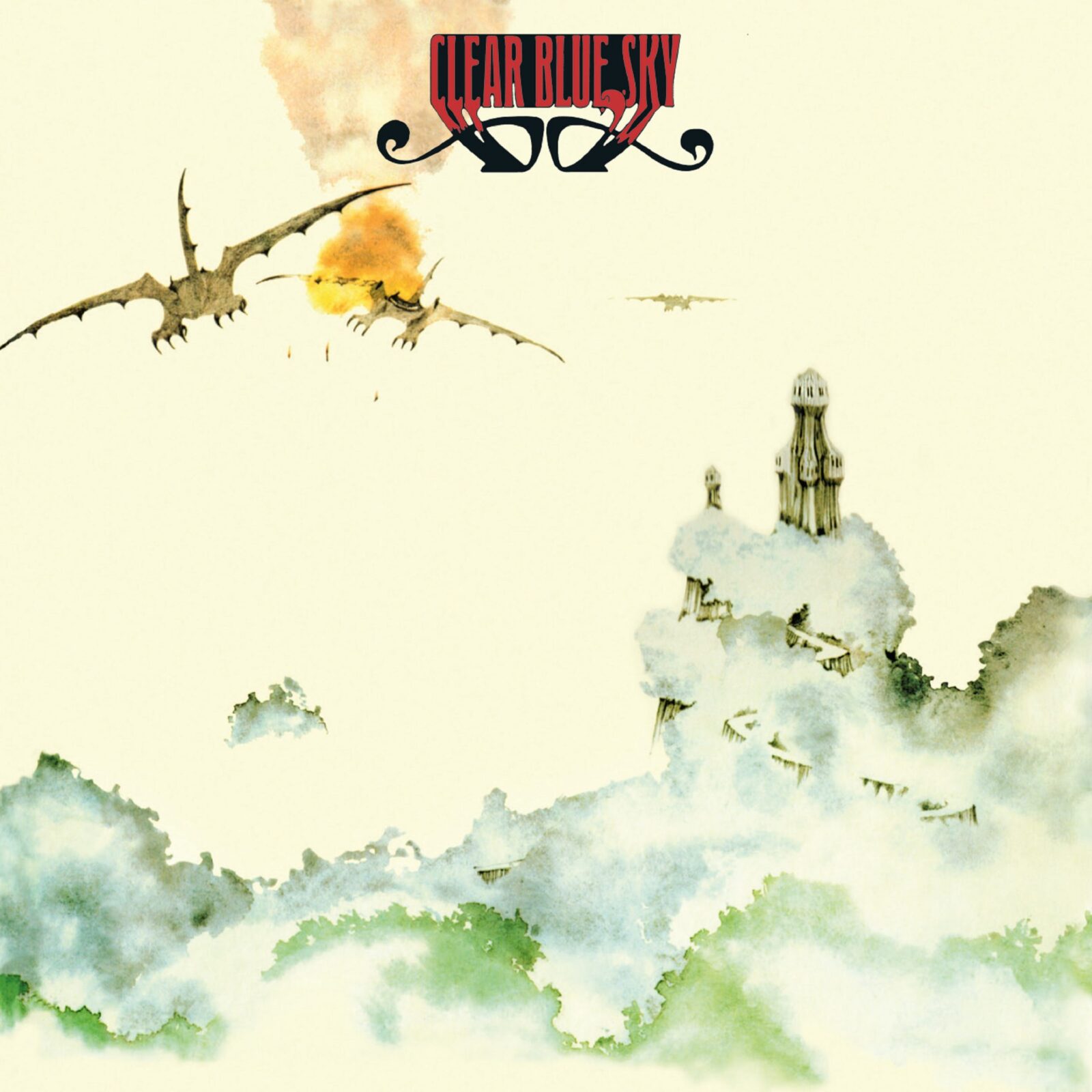
Would you share your insight on the albums’ tracks?
The basic sound is entirely Clear Blue Sky of course, and the songs entirely original, and we liked to use a lot of light and shade, hard rock into melodic elements. Ken and I practised a lot together and I would come up with ideas, which transferred into the band. Ken wrote some lyrics actually. We put an oscillator effect on the guitar on ‘Sweet Leaf’, which I’d never used before. Mark used a double bass and a bow on ‘The Rocket Ride’, which was remarkable, as he had never done that before. He was really very talented. ‘The Rocket Ride’ came about because we were always together in the local pub called The Rocket, in Acton, W.3.
Towards the end of ‘Birdcatcher’, Patrick laid microphones on the floor and what you hear is us three walking around in circles. But the recording session overall was over very quickly. Nevertheless, it was a great learning curve and I value it of course.
Do you feel that more time would end in a different sounding album?
But yes, I feel it could have been a lot better. But anyway, I’ve moved on so much since then, and the first album does not define who I am musically today. It was a product of my youth, but like me, the music has matured and grown in so many ways. The last re-issue was by Cherry Red Records. I restored the ending on ‘Birdcatcher’ for them, which had been missing on the many previous re-releases, did an interview for sleeve notes, provided lots of photos and etc., but you know, they never even had the courtesy to send me a promo copy.
Where did you know Jon Field from Jade Warrior that played on ‘Birdcatcher’?
I already knew Jade Warrior’s Tony and David Duhig from my school days as the brothers lived locally to me in west London. I met Jon through David and we had a great time playing together at the Scotch of St. James Club in London. Tony died quite young, but I was in touch with David over the years, but sadly he too recently died.
Led Zeppelin’s ‘III’ was in the making in the same building. Have you ever seen the guys of the band?
Oh yes. As a youngster, I saw them in a very small club in Southall, UK. They were just beginning. The power of the band in such a small club fairly pinned you to the wall. It’s no wonder so many of us have tinnitus nowadays! I saw Led Zeppelin at The Marquee Club in London too, but it was before they took the name Led Zeppelin and were then called The New Yardbirds. They had already gathered lots of experience and were firmly established. But yes, Zep were making their new album at the same time as us. Fortunately for them they had the luxury of time and produced a brilliant result of course.
Would you like to comment on your guitar technique? Give us some insights on developing your guitar technique.
My guitar technique is entirely self-taught. Obviously I was very young when I started learning to play guitar. I had a burning desire to learn, but I was a bit of a laughing stock, because others were playing fluently and I just couldn’t learn. I took tuition from music teachers but I was hopeless. The theory side of it was like a foreign language, but all that uses a different part of the brain apparently. In the end, I would shut myself off in my bedroom in our council house flat, and with the old vinyl record player I taught myself by playing along to records by the old blues daddies that I came to love. Somewhere, somehow, it all came together. Hardly a day goes by when I don’t play guitar, and I am always learning. I experiment a lot with all sorts of effects. I’m always trying something new.
What kind of gear did you have in the band? Did Vertigo supply it or did you own it?
The equipment was my own. I had a Fender Telecaster guitar, 2 x Vox AC30 amplifiers, one of which had a treble boost with the blue speakers. I also had a Vox Wah-Wah pedal. Vertigo didn’t supply a thing, at least not to my knowledge.
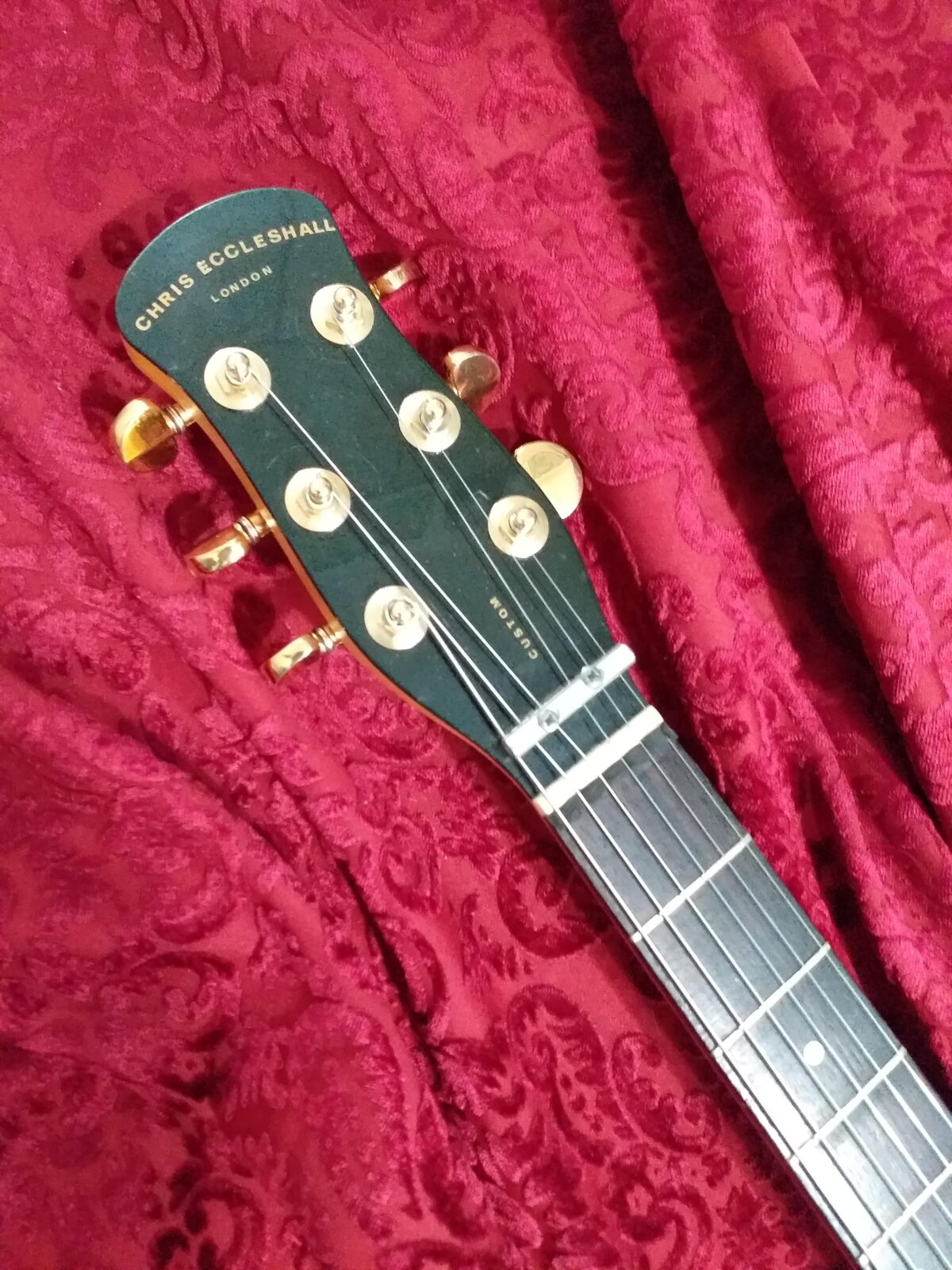
These days I have a variety of guitars, but mainly Fender Stratocasters and Ibanez RG550 as well as Telecasters. I have a unique custom stick guitar, which renowned luthier Chris Eccleshall made especially for me in the early 1970s, and that is unique and has quite a unique sound, very powerful and great for playing slide. I use Marshall and Yamaha amps with a combination of effects pedals.
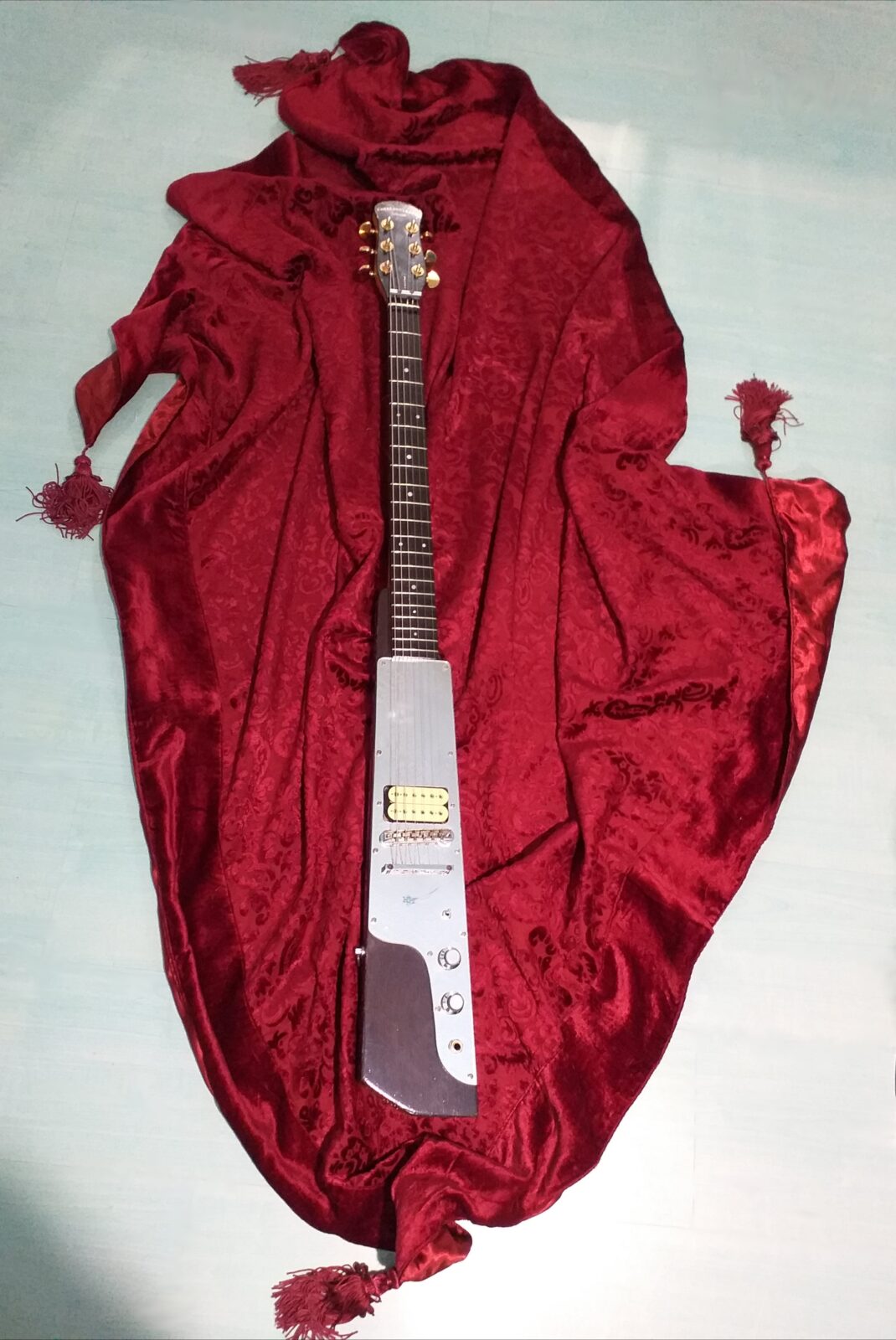
The artwork was by legendary Roger Dean.
It was one of Roger’s earliest album art creations. I feel he captured the nature of the music well with the craft and the sky. It matched the band name, but also captured the light and shade, the hard edge rock and softer elements infused within the work. Also the hand drawn logo came about by chance. Roger Dean did not do typesetting then, and created by hand the band name and it was liked so much, it stayed as it was. Elizabeth Baker-Finch, wife of Ginger Baker and descendent of Neo-Impressionist artist Alfred Finch, created another logo similar in later years, as well as album art for ‘Cosmic Crusader’ and ‘Out of The Blue’. My personal favourite album art is the collector’s album ‘Gateway to the Seventh Dimension’, which is the work of John Pitre. His work is extraordinary. I love his use of colour, light and spiritual aspects. He is also a wonderful, generous human being and is extraordinarily gifted.
I feel one of the worst inventions was the tacky CD case, horrible things, cheap and flimsy, because it minimized the artistic input which was such an important visual aspect of creative music. It’s no surprise vinyl is growing in popularity again.
You did a lot of touring… What would be some of the craziest stories that happened on the road?
We had various bass players after the original, Mark Sheather left. Andy Chard joined and was so excited to start touring. He bought himself a brand new bass guitar, and kept it unopened until he got to the first gig. When he did eventually open it just before going on stage, he discovered it was indeed a lovely bass, but it had no strings! Fortunately, the support group provided some, which got us out of trouble.
I didn’t enjoy the massive egos we encountered. Fairport Convention refused to let us use the P.A system on one gig, but the owner who had set up the system opposed the hostility and allowed us to do our set. The same happened with Country Joe and the Fish.
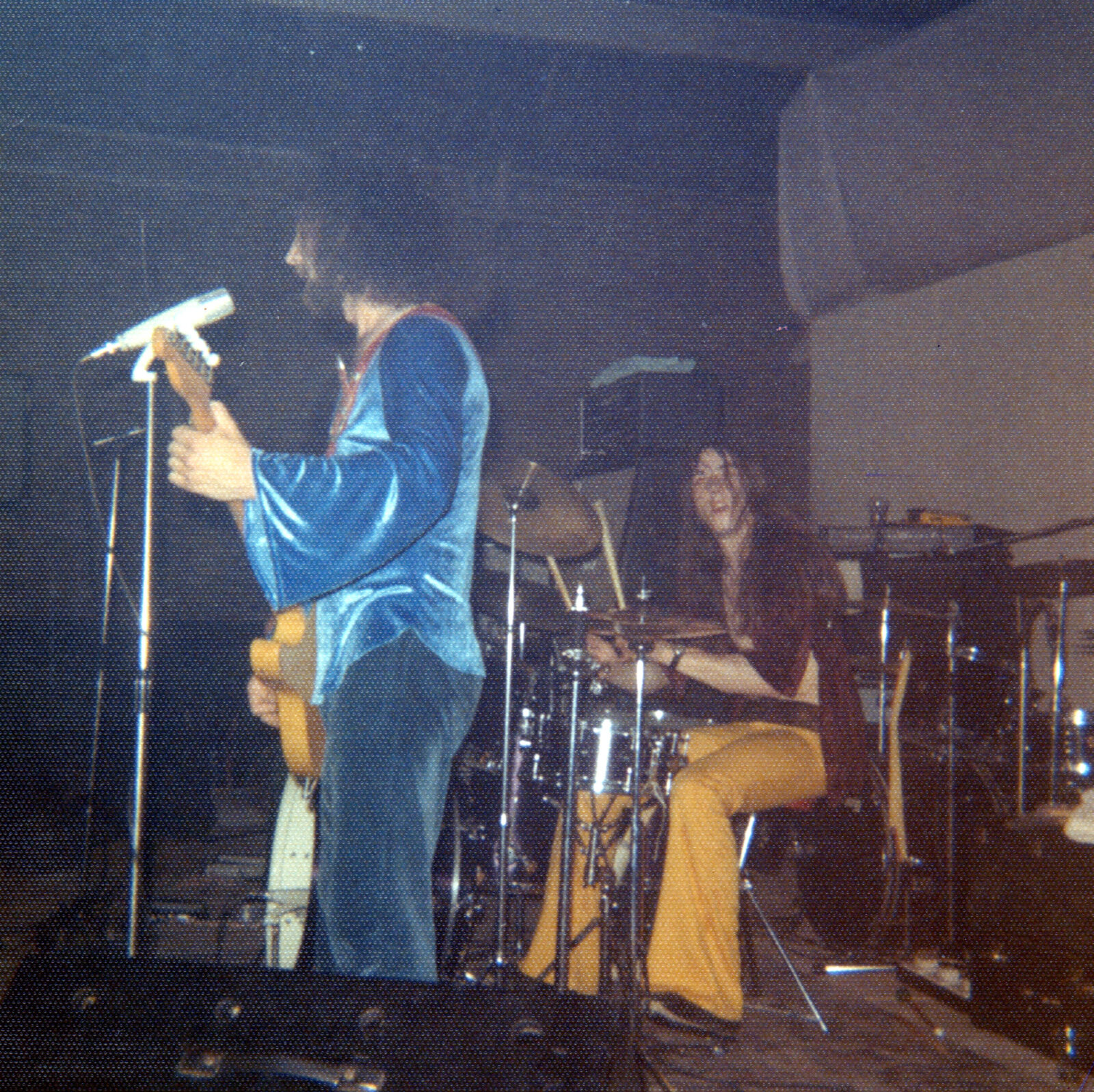
What was the end of Clear Blue Sky?
It was hard to keep CBS going, and we had quite a few line-up changes, I got exhausted, although bass player Kraznet and Maxine Marten eventually became constant members. It was put on the back burner for a while, but I have never officially ended the band. It remains an open project for now. We always think there won’t be any more interest in the band, and yet it goes on after all these years. Anything new since the last album ‘Don’t Mention Rock ‘n’ Roll’ has been dormant for a while, but I do have recordings of some of the first songs that never made the album, and I have a lot of live recordings. But we’ve probably moved on from doing any new stuff, and anyway I’m doing so many other new things now, especially Light Trails. I owe it to myself to keep evolving. I don’t want that first album to define who and what I am as a musician. I hope I have grown and expanded since then, because my musicianship is an on-going journey.
Clear Blue Sky represents my ever-expanding musical journey, it has been with me since my youth and will probably remain, at least for a while longer.
Later on you joined Tangerine Peel. Were you part of any of their recordings?
Yes I did a lot of recordings with them. I replaced Mike Chapman who became hit maker Chinni chap. I didn’t stay long because the rock elements were really what I wanted to get back to, and this material was more lightweight, commercial stuff.
Tell us how The Ginger Baker Band came about for you? What period were you part of the band? Did you do any recordings?
Sure. I had a 3-piece band called Separate Energy in the early 1980s. We were on the gig circuit for just a while and were doing some great gigs. We were spotted by Ginger Baker’s management, having been recommended by Andy Chard, and were offered a tour, which became the first of several. There were recordings, including live, big stadium recordings. Ginger’s life was very chaotic then, as it was in general, and I would love to hear the recordings because when Ginger was together, it was fantastic. I got on with him just fine, but bass player Ian Macdonald took a lot of stick! Ginger was a strange mix, he could be very aggressive and difficult, but also very vulnerable at times. I don’t think many saw the vulnerable side of his nature as I did.
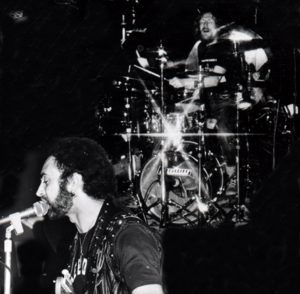
What was it like to play with Baker?
I smiled when I read the question. When it was good, it was brilliant. But it did depend on what mood he was in and what he may have consumed. On the first tour we had huge gigs lined up, but there was no rehearsal, nothing. All we got was a verbal brief discussion before the first gig, including altered arrangements on the songs. It was a challenge, but we did it. Ian Macdonald and I had so much live experience and we were seasoned jammers, so we fed on the moment and crowd enthusiasm.
But the very first gig was a shambles. Ginger was so out of it – goodness knows what he was on – that he was falling all over his drum kit, and couldn’t really hold it together. He embarrassed himself and knew it. Amazingly, we got an apology and after that he really stepped up. It was then we got to experience his talent, and it was fantastic. He was everything the critics said he was, and I loved his jazz roots. He was an interesting character. He could be so harsh towards people, but then he had this very vulnerable side to his nature, and was quite naïve at times believe it or not.
I got to know all of Ginger’s family, and had a band with his son Kofi Baker. I have lots of recordings made in analogue from that time, all original songs. It had a lot of rock fusion elements.
How did you meet Ian Macdonald and what led to Separate Energy?
We met in west London, around 1979-80. He had a band called Furniture who had a number 2-chart success. He was also with Klaus Bohling (Secret Oyster) in a band called Elektrum. Sadly we lost Ian prematurely recently in a car crash and that was very difficult. But when we first became friends, we had an informal jam with ace drummer Paul Gibbs, and it just worked, and so we decided to put a 3-piece band together. It took off really fast; we were doing great gigs more or less straight away. It was during this time period that Ian and I were asked to join Ginger Baker. Ian was a staunch vegetarian, tall and thin, and Ginger gave him so much stick over it, telling him to eat properly!
You played at Stonehenge festival. Those free festivals were something else….
Stonehenge was like a world on its own. Good music, but also all sorts of goods and drugs openly being sold in the market areas. Apparently they got away with it because it was private land, but Stonehenge stopped after that. We did actually track down some film footage of Separate Energy live onstage at Stonehenge and it’s good to have, especially with the recent loss of Ian Macdonald.
Do you have any recordings that might see the light someday?
Yes, I have a lot. As stated I have a lot of Clear Blue Sky material including live recordings, plus other songs I have recorded randomly throughout the years. I have all the Karizma stuff with Kofi Baker and all sorts that I’ve randomly recorded.
You were also friends with John Entwistle…
I certainly was. John was such a colourful character, and lived his life in true rock ‘n’ roll style. He was wealthy and then he wasn’t, always his life was on a rollercoaster. He bought me back a beautiful guitar from the USA, but later when he was in a financial dilemma over his divorce, asked for it back and sold it. That was the way he was. It was no surprise that he died in the manner he did. We got on really well as friends and also as musicians. John would turn up at my gigs and get up and play with us. We recorded original material too but I’m unsure what happened to it after he died. John was a great guy and musician; he did so much for music and bass players.
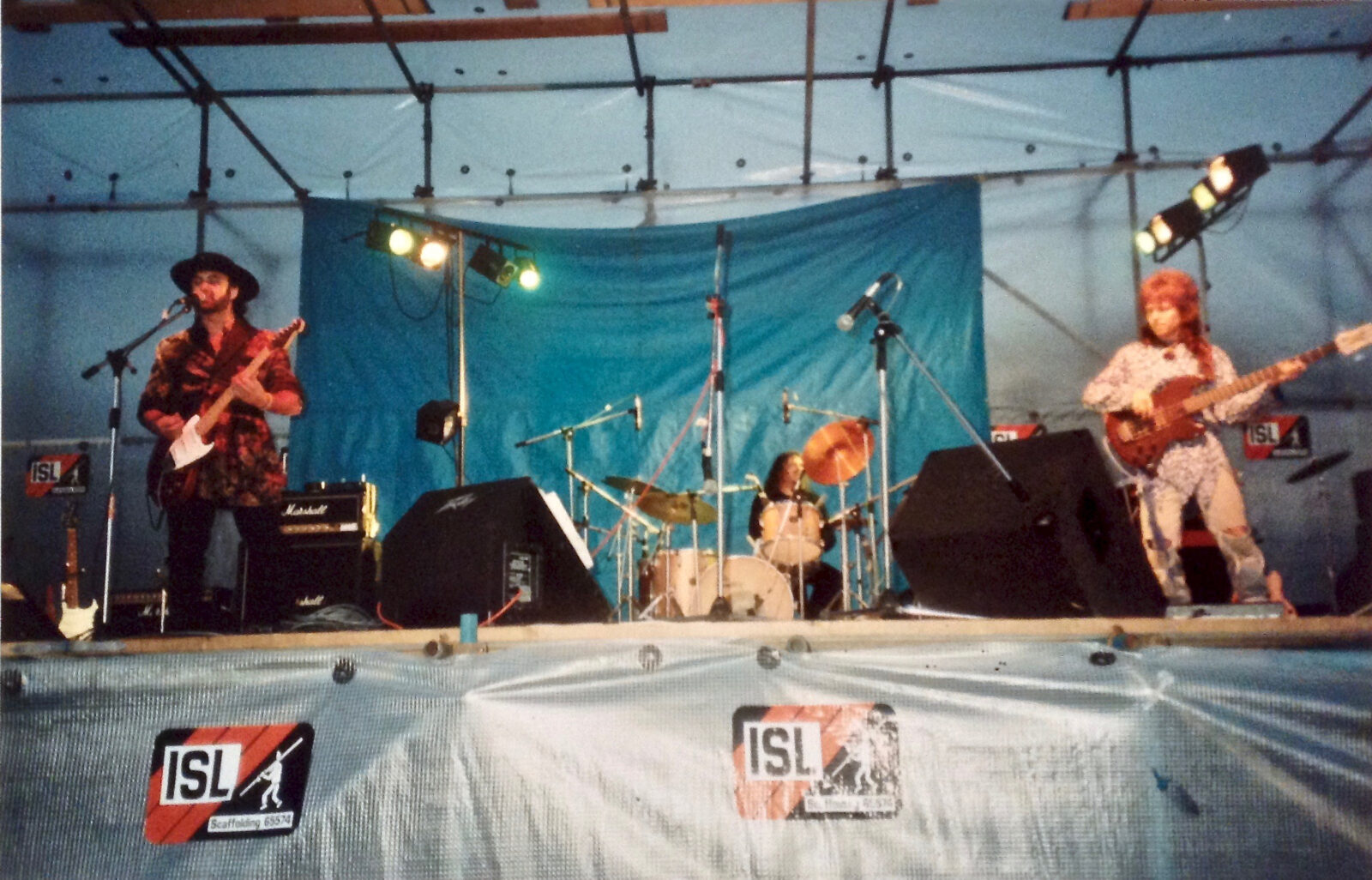
Clear Blue Sky recorded much more material. Would you like to share a few sentences about each of the albums?
Yes, ‘Destiny’ was a collection of demos and outtakes from the 70s. It was never recorded as an album. ‘Out of the Blue’ featured the earliest recordings; some made even before the Vertigo album, which were demos, and the album also features a live version of ‘My Heaven’. The artwork is by Elizabeth Finch-Baker (Ginger’s first wife).
‘Cosmic Crusader’ was my first venture into self-recording. I was going to give up music, but Maxine Marten (now my wife) said no, and bought me a Tascam 4-track recorder. We experimented with that, then took the plunge and bought a 12-track analogue recorder from the band Talk Talk. We made ‘Cosmic Crusader’ on this. Maxine Marten wrote the title track. I got hooked on recording then, and also still have an 8-track reel-to-reel recorder which has an awesome vintage sound.
‘Mirror of Stars’ was inspired by research about the ancient pyramids aligning to the stars. A naïve reviewer wrongly interpreted the meaning of the album and wrote a review about Hollywood film stars looking in mirrors. Our record company framed the review and hung it on the wall, we laughed so much! So never assume people are always on your wavelength! But actually, since ‘Cosmic Crusader’, the music has a lot of fantasy, and also spiritual aspects and meaningful lyrics. The music over the years seems to represent a journey in life, a quest for knowledge, and a reflection of the understanding of it. Rarely do we produce mundane content. Perhaps some find it challenging to understand, but I also believe the value of the music is in the ear of the listener and what it means for them, not me.
‘Gateway to the Seventh Dimension’ was our first departure into digital recording. Kraznet – Clear Blue Sky’s bass player – is a technical wonder and through his long-term engineer/recording experience, which included The Rolling Stones mobile recording unit amongst many others, became the trouble-shooter, and online tutor for Magix Sequoia recording system.
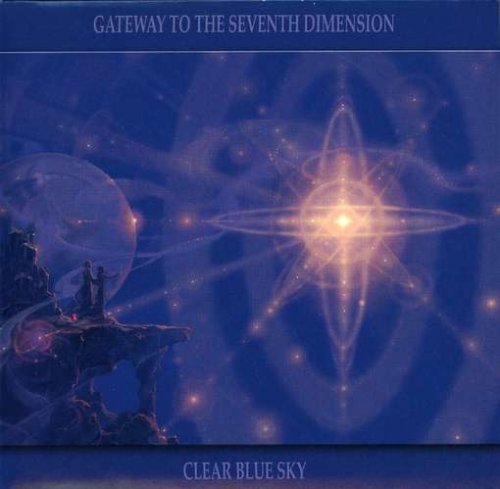
His art of persuasion to get me from analogue and into digital format was eventually empowering to me because today I love it. I appreciate his patient tuition and support. Today I am totally self-sufficient. But ‘Gateway’ came to mark great changes in our lives, because we lost so many people in death at that time period, and it made us consider spiritual possibilities, and is an emotional exploration of that time period. The artwork is by the great visionary artist John Pitre.
‘Don’t Mention Rock n Roll’ – This was so spontaneous; I mostly invented the songs at the moment during recording sessions in the studios in London. Drummer/percussionist Thomas Tiefenbacher came over from Germany and stayed with us and we went and recorded the album. We recently did a virtually live video version of the title track, ‘Don’t Mention Rock ‘n’ Roll’, featuring Lee Limerick on lead vocals:
What about the Census of Hallucinations?
Tim Jones and I met through record company Hi-Note Music many years ago. I’m known for taking an interest in other musicians and Tim’s music is so very original and diverse. Also, he has tirelessly promoted and produced other people’s music.
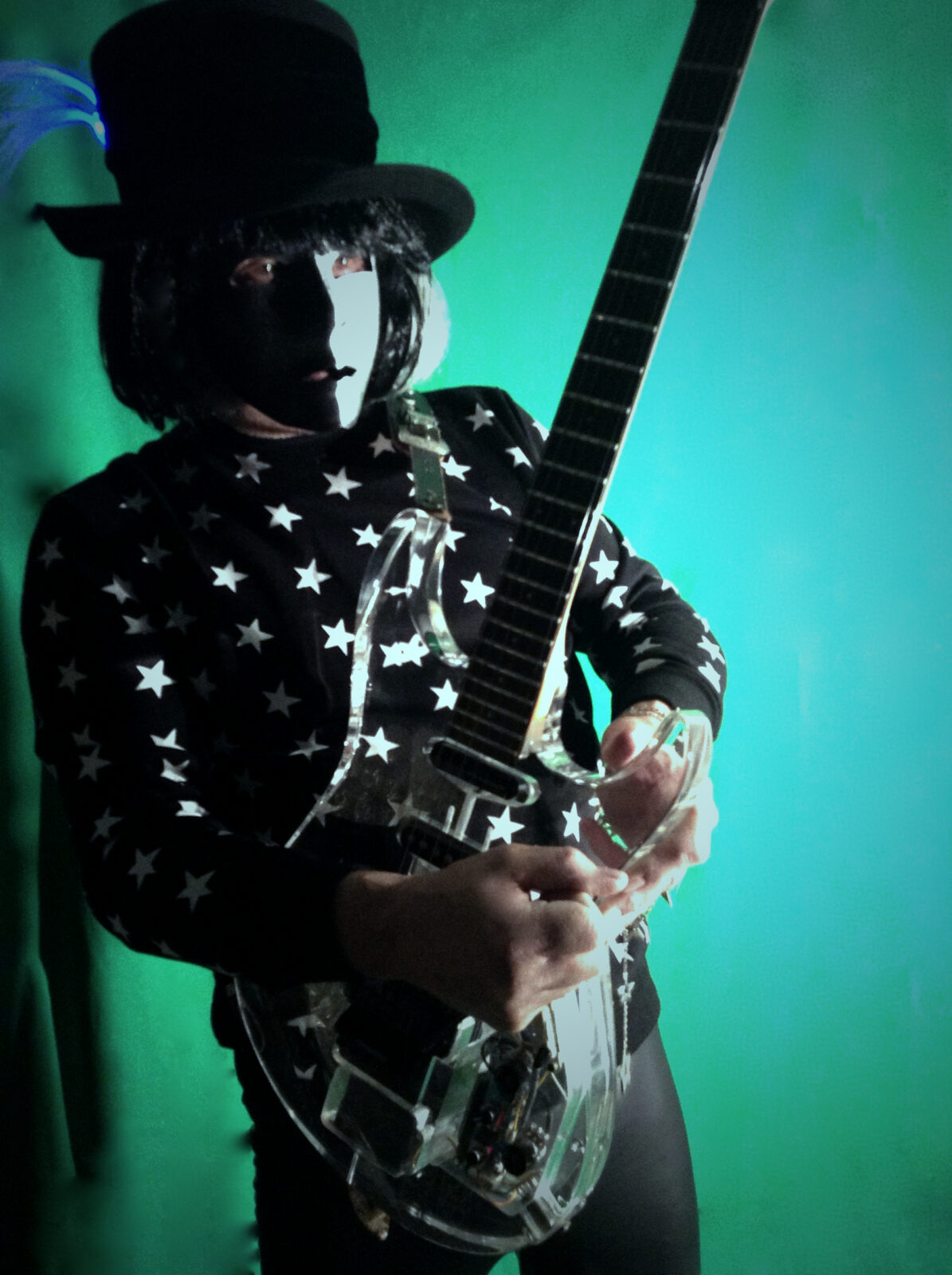
We struck up an enduring friendship and did lots of recordings together for a while. ‘Stars’ is a particular favourite, and Maxine Marten put together a great fantasy video for it. Tim’s music can be spontaneous and extremely diverse.
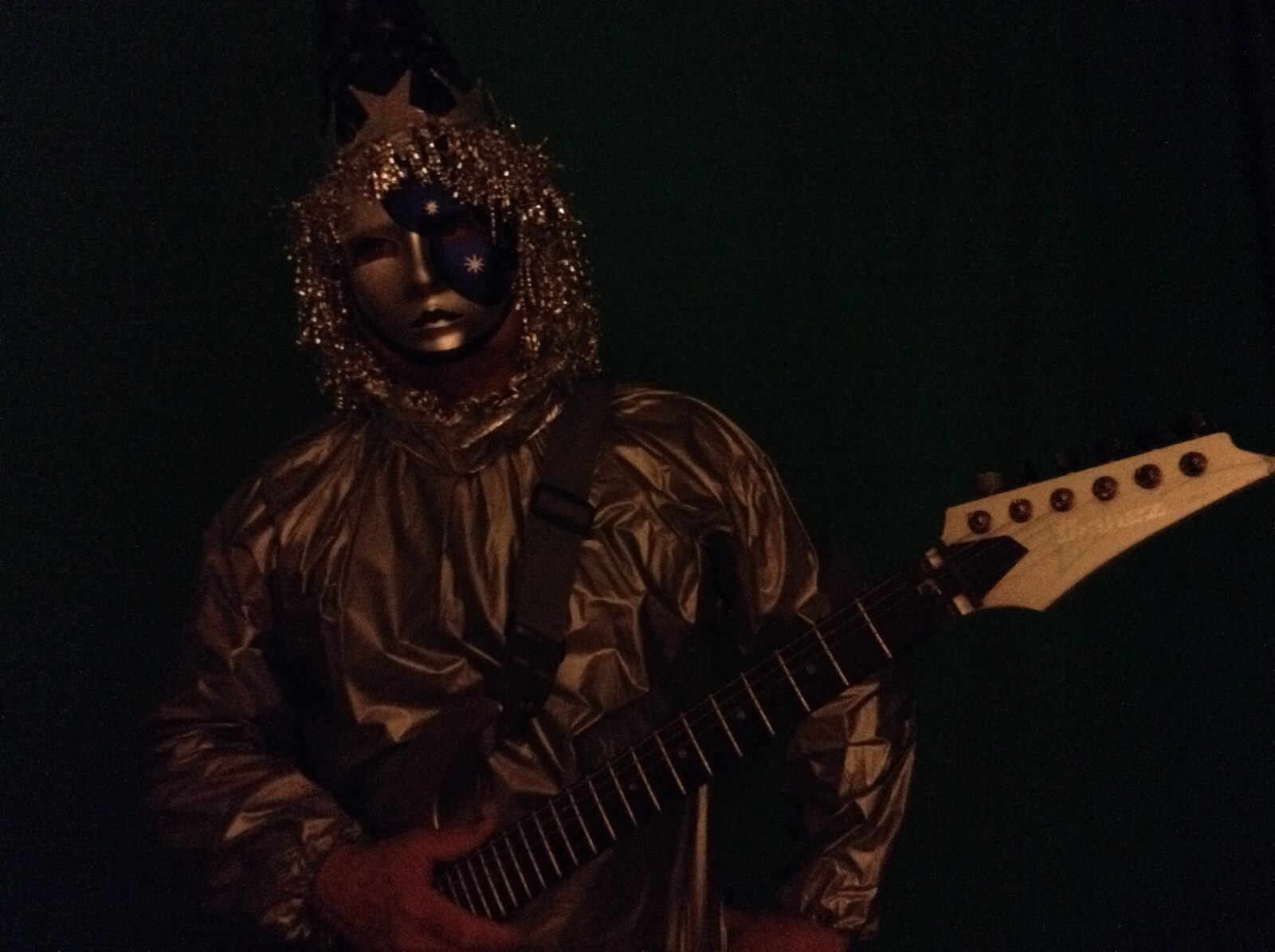
You never know what he will come up with and I like that.
Then David Hendry’s Ohead… how did that come about?
Maxine Marten found Ohead some time ago when she ran Stone Island Records. He is a phenomenal talent. He is quite the perfectionist, and does pretty much everything – song-writing, production, he makes videos, creates stunning artwork with wonderful, vibrant colours. His music spans across the psychedelic space rock genre, offering power riffs through to the most beautiful luscious, dreamy soundscapes. We’ve done some great work together and there will be more to come. He features on Clear Blue Sky’s last album, ‘Don’t Mention Rock ‘n’ Roll’, and on my recent solo release John Simms Light Trails ‘Chromatology’. I’m on his most recent albums too, and so are Maxine Marten and Tim Jones. David has had much success with previous projects under various names.
These days you’re moving more into the space rock category… Do you enjoy the more “open / atmospheric sound”?
I’m an intuitive musician really, and quite spontaneous. I go with the flow of how I feel at the time of creation. I blend all sorts of styles really – fusion, space, progressive, heavy rock, dreamy melodic styles, and like to create moods and stories, I love music that tells a story and is emotional. I’m doing other work with all sorts of other people too. I am working on a new John Simms’ Light Trails album too. Watch this space!
You also played with Bernie Torme…
Ah yes, dear Bernie. I knew Bernie for years, since around 1980. In those days he was literally so colourful, with hair all shades of the rainbow. He had quite a stutter, but sang fluently. Bernie was such a lovely person as well as a great talent and ultra-loud live. We toured together all around the UK in the early 1980’s. For his last album – and who could know it would be his final – I played some lead guitar. But he was badly let down by Pledge Music, and Bernie had financed the album expecting Pledge Music to release funds on completion. But they went into liquidation and it caused him, and so many other artists, so much distress. My last conversation with Bernie was about the completed album, and about touring. He was thinking of stopping touring altogether. He was feeling unwell then, complaining he had a flu-type illness and a cough, which he couldn’t shake off. He was hospitalized with double pneumonia, and sadly slipped away. It was at the beginning of Covid-19, so I do wonder if it was an early case. It was such a painful loss. But I’m glad I did some guitar for his final album, and it’s something of a comfort.
What are some of the most important players that influenced your own style and what in particular did they employ in their playing that you liked?
In the early days, Bo Diddley was special to me. I loved his sound and style of playing. Also I liked Peter Green, Jimi Hendrix, Albert King, Frank Zappa, early Eric Clapton, and Hank Marvin. I was a compulsive live music attendee, and having seen these musicians strut their stuff was so inspiring. A lot of new music was being generated then. I practised my guitar playing every day, and still do. I never tire of it.
Can you share some further words about your latest album, ‘Chromatology’?
At last – and not before time! – I have a solo project, namely John Simms Light Trails. I called the first album ‘Chromatology’ because it’s all about the vast colours of music, the tints and shades, light and dark elements. Over the years my style has evolved to incorporate all sorts of genres, and I notice reviewers and people in general can’t really pigeonhole it. Rock fusion, progressive, space-rock does cover some of the bases I guess, but by no means all. I don’t plan anything, I just play what I feel in the moment and then the piece evolves. The emotional feel and what it conjures up in the heart and mind is important to me. I don’t set out with a plan for the album, it’s rather spontaneous, and most of it was done during the pandemic lockdown.
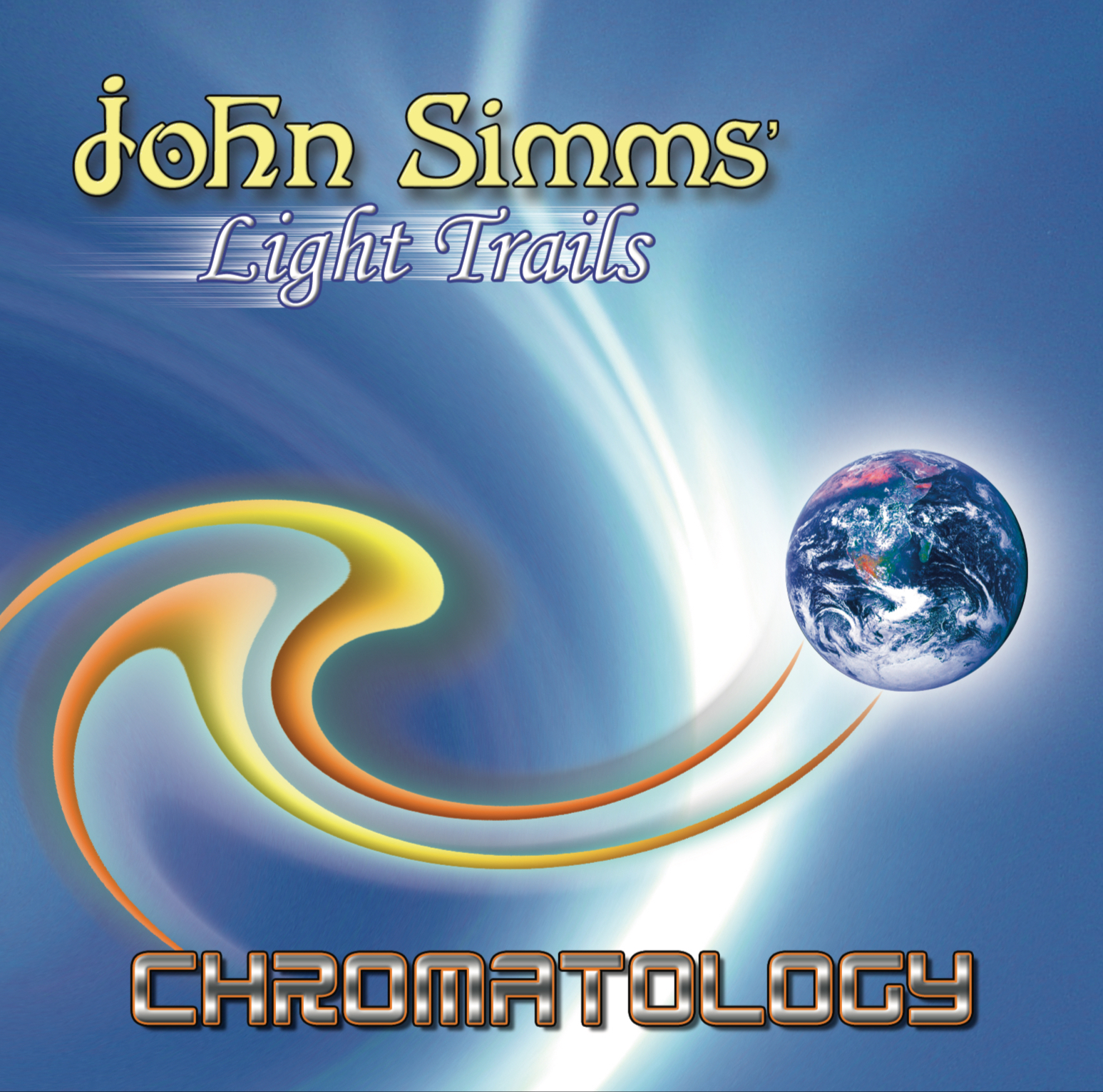
You had some special guests on it…
On ‘Chromatology’ I have several other musicians on it. I tend to work with those who are not only good at what they do, but are people I know and trust. I’ve come across so many difficult characters in the field of music over the years, so I avoid those. Tim Jones of long-term label, Stone Premonitions and David Hendry aka Ohead, are gifted musicians and loyal friends, and we have an easy and open relationship. Maxine Marten has been my main lyricist and vocal arranger since joining Clear Blue Sky. Other than that, I play more or less everything myself, including bass, keyboards and all guitars of course. All my songs are entirely original.
Are you working on something else?
I always have something on the go. I am creating a new Light Trails album, and am very happy with the results so far. I have various projects currently, and was delighted to contribute to an album project entitled ‘Miniatures’, which also features Toyah, Sonja Kristina, John Otway, David Jackson (Van der Graaf Generator) amongst others.
Let’s end this interview with some of your favourite albums. Have you found something new lately you would like to recommend to our readers?
There are so many, but early albums include Jeff Beck/’Truth’, Jimi Hendrix Experience/’Electric Ladyland’, Frank Zappa/’Hot Rats’, Captain Beefheart/’Trout Mask Replica’, Mahavishnu Orchestra/’Inner Mounting Flame’, Gino Vannelli. Recent music…Riversea & Marc Atkinson…and we have Clear Blue Sky radio now and love to promote independent music from around the world, and so much great music comes in. Digital recording has revolutionised music production, it’s so cost effective and accessible, and I just love to hear the studio quality stuff produced by people often produced in their homes.
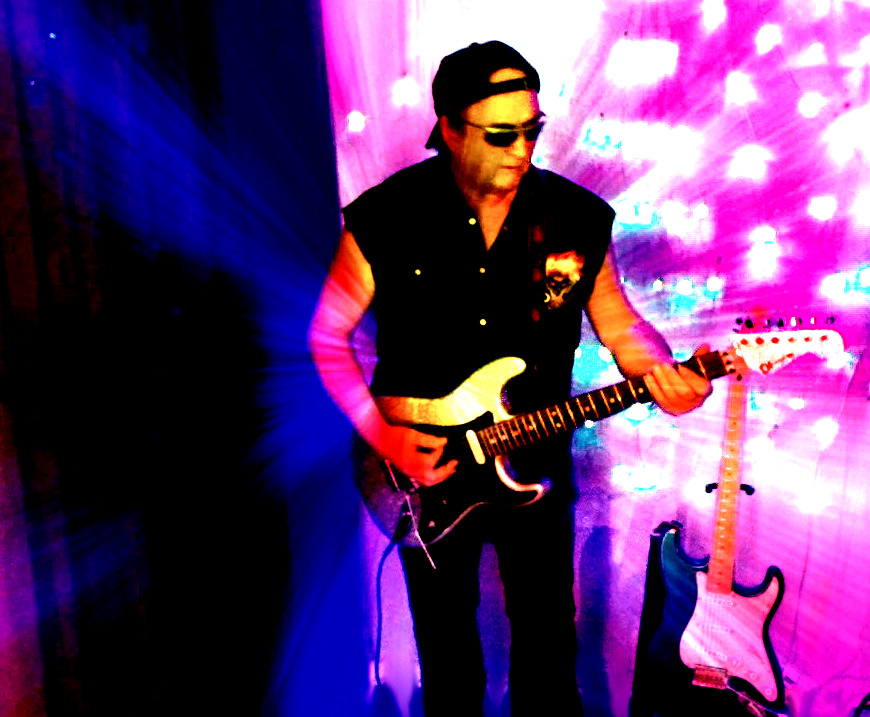
Thank you for taking your time. Last word is yours.
It’s been a pleasure and thank you for all you do for musicians everywhere. I’m 70 years old now, and hope I live many more years and create a great deal more music. I’m fit and healthy and my love of music has only grown over the years. I would like to thank everyone for their support and kind words, as it means a lot to me.
Klemen Breznikar
Headline photo: Clear Blue Sky CBS promotional photo
Clear Blues Sky Official Website / YouTube / Twitter
John Simms Official Website / Facebook

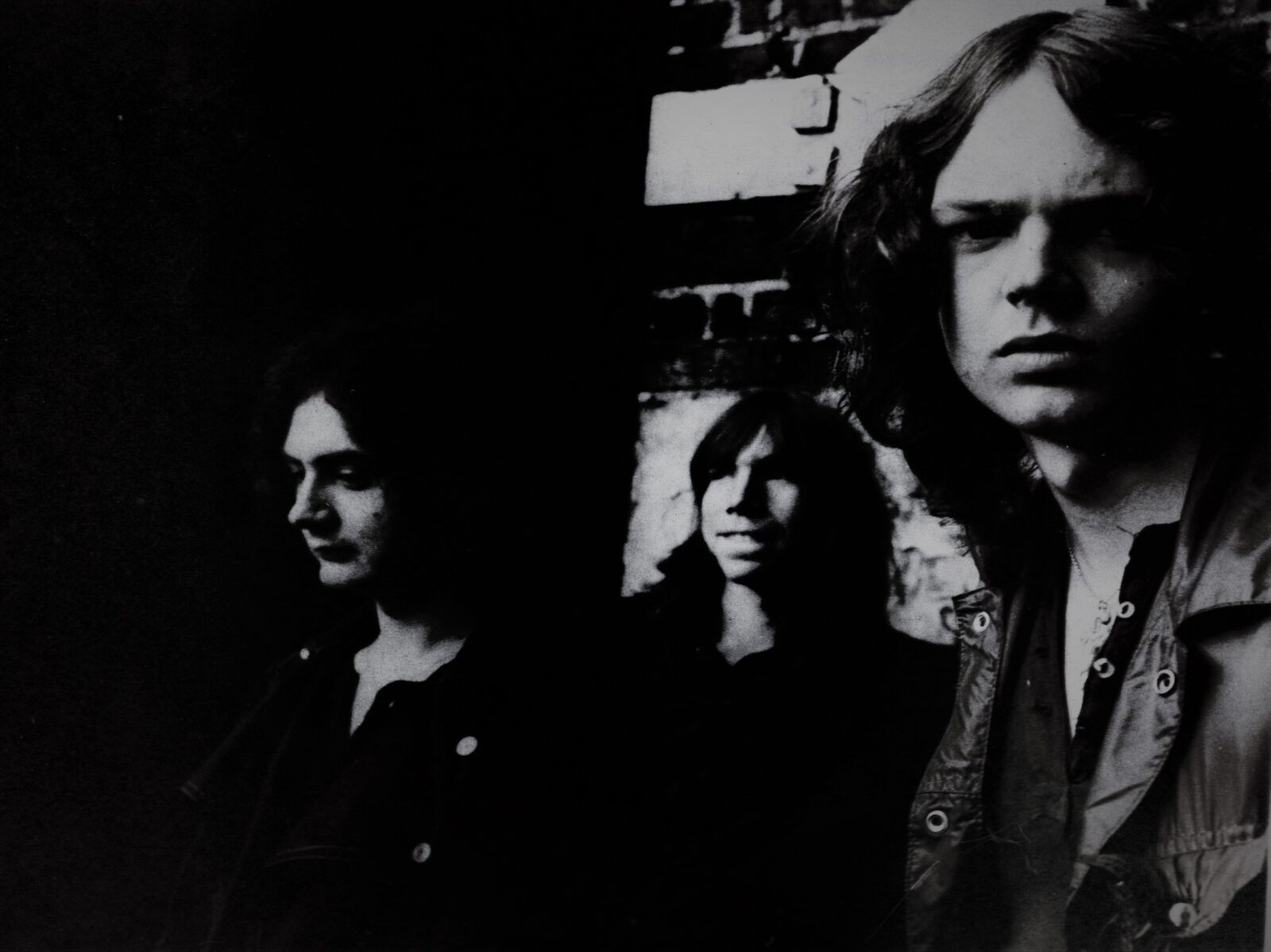
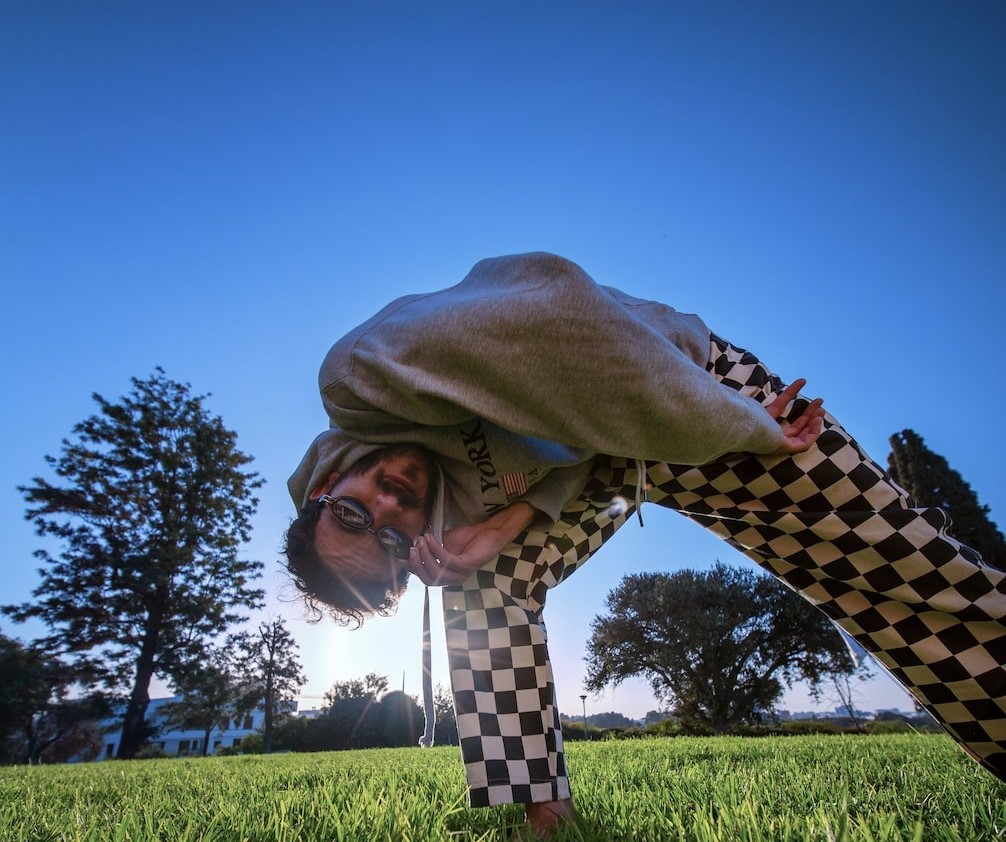
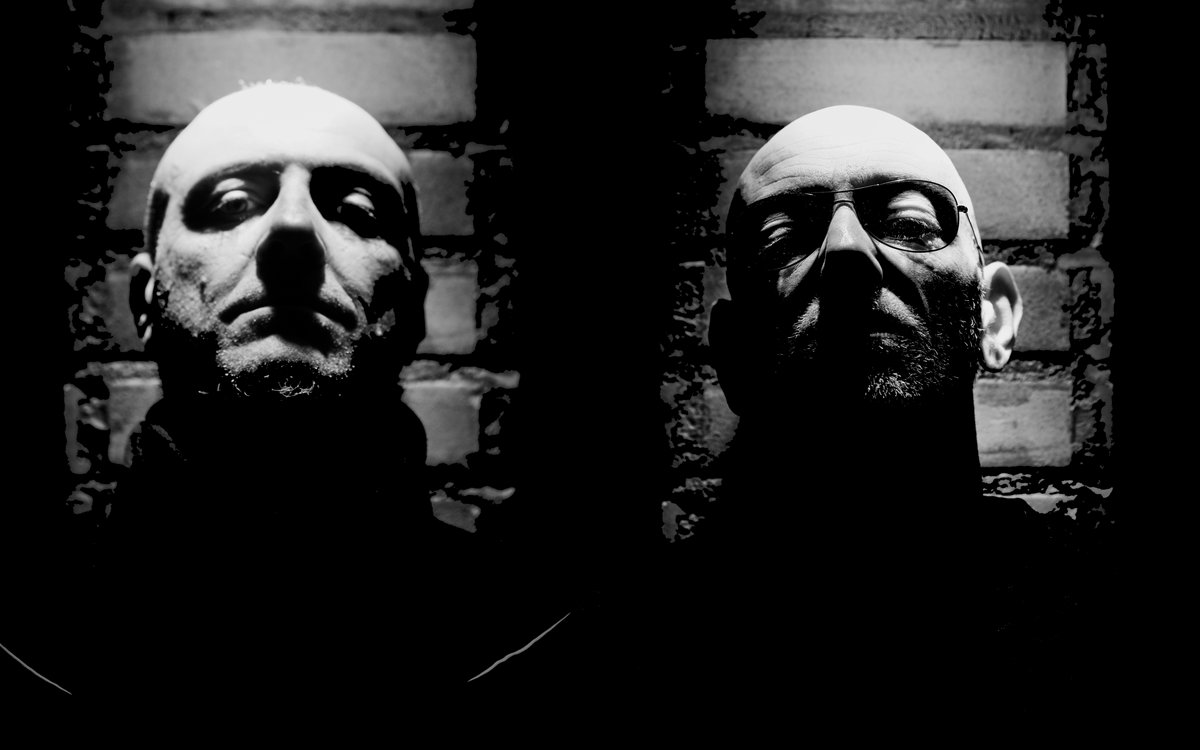
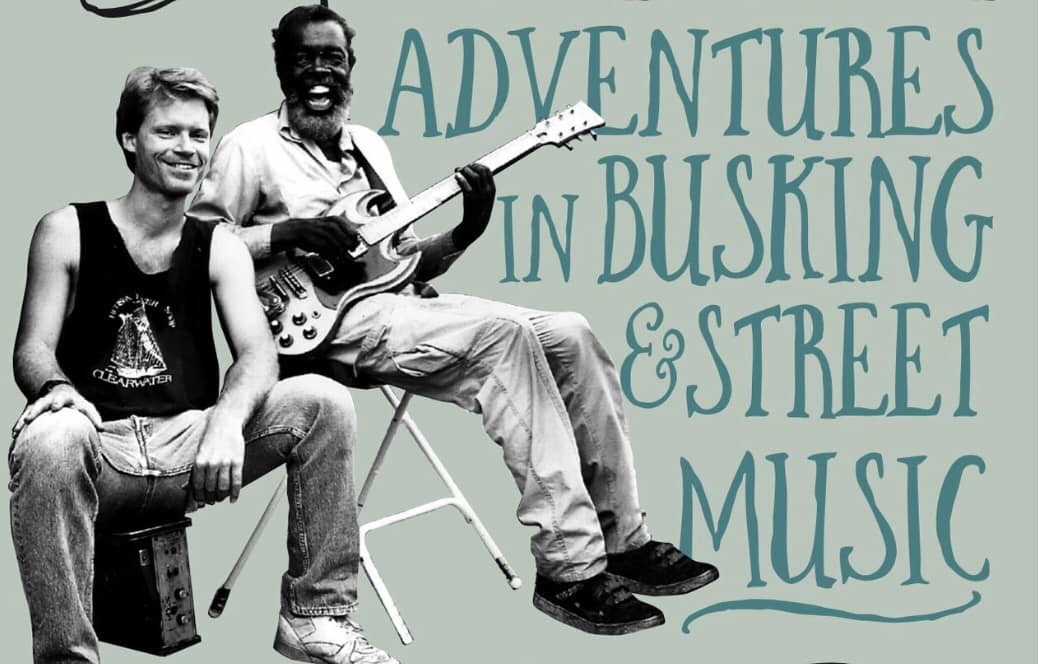
Thank you Klemen !
Wow didn’t know Clear Blue Sky and John Simms did all this other stuff. Fantastic interview thank
Wow great reading
The style of questioning is much better Klemen, much better than the previous style and it shows. The interviewee responds more favorably. Good interview too; Simms seems like a good guy and has had an interesting career. Clear Blue Sky looks worth checking out.
What a great interview with a special musician. I still cannot get my head around how as such a young man/boy could lay down such awesome music. The track Sweet Leaf is in my opinion a guitar masterpiece. I still play it reguarly 50 years on. Thank you to John Simms and the interviewer.
John, I told you, you would make it back in those early days, keep on rocking my friend, you are the best,, Chris,, ???